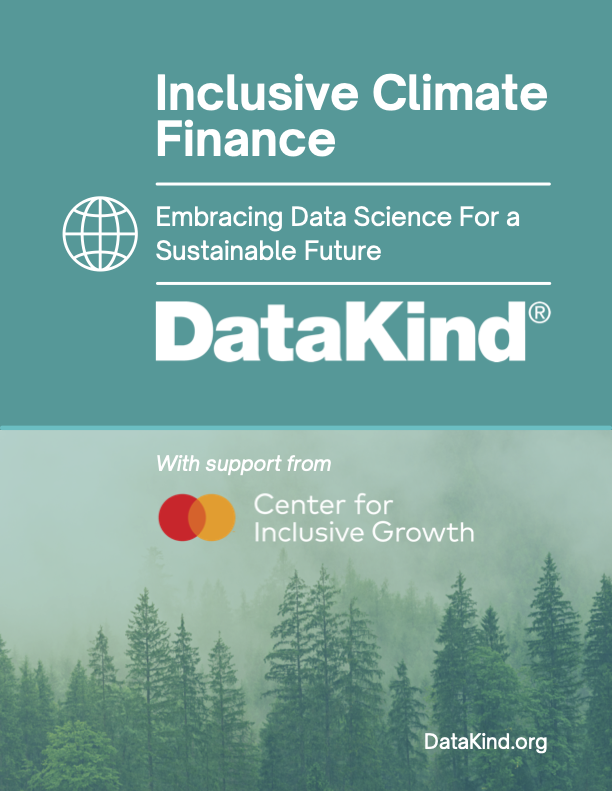DataKind’s report highlights some consistently reported successful strategies in inclusive climate finance. One such strategy is targeting savings programs to women, giving them more resources to manage income and livelihood shocks. Savings programs, in general, have proven effective in reducing poverty indicators, such as increased savings, improved incomes, and enhanced food security, particularly in sub-Saharan Africa. Additionally, mobile payments have facilitated remittances, which can improve resilience after economic or disaster-related shocks.
Climate change is an existential threat to our planet, and addressing it requires innovative solutions that are not only effective but also socially equitable. Inclusive climate finance (ICF) is a new approach to generating insights, identifying new opportunities, and, ultimately, combating climate change via financial solutions. DataKind’s new paper, Inclusive Climate Finance: Embracing Data Science for a Sustainable Future, digs into ICF at the intersection of climate finance and financial inclusion, identifying data gaps and offering data-driven solutions to tackle climate change.

The Intersection of Climate Change and Economic Vulnerability
Economic status plays a pivotal role in determining vulnerability to climate change. Lower-income households and micro, small, and medium-sized enterprises (MSMEs) are disproportionately affected by natural disasters and climate change shocks. These communities often lack the resources to recover from these shocks, perpetuating a vicious cycle of economic insecurity and climate change impacts. It’s estimated that climate change could push over 130 million people into poverty by 2030, emphasizing the urgent need for innovative financial solutions in this space.
The Link Between Financial Inclusion and Climate Finance
Traditionally, climate finance and financial inclusion have operated independently. Climate finance aimed at mitigating climate change, while financial inclusion focused on increasing financial access for vulnerable communities. However, this siloed approach is proving insufficient in the face of climate change. In recent years, these two financial approaches have begun to merge, giving rise to ICF. This approach aims to make financial solutions to climate change both socially equitable and effective in reducing climate change drivers and impacts.
Challenges of Inclusive Climate Finance
DataKind’s analysis identifies several challenges in the field of ICF. One of the foremost challenges is the lack of clarity in terms, indicators, and data availability. Ambiguity in these areas hinders our understanding of how ICF operates and achieves its goals. To address this, many experts advocate for the development of concept and data taxonomies to bring clarity to the field.
Another challenge lies in the diffuse nature of data in this space. While data is abundant, it’s spread across various sources, making implementation and impact assessment elusive. However, innovative use of machine learning and statistical analysis of satellite data has shown promise in verifying mitigation practices, fostering access to carbon markets, and facilitating payment for ecosystem services. This underscores the importance of investing in data science to maximize the impact of ICF.
Solutions in Inclusive Climate Finance
While short-term interventions provide substantial support, the report also emphasizes the need to investigate the longer-term social impacts of financial inclusion. Understanding how financial inclusion affects society over time will be crucial in shaping more comprehensive and sustainable solutions.
ICF represents a vital policy agenda for addressing climate change equitably and effectively. DataKind’s landscape analysis sheds light on the challenges and opportunities in this emerging field. As the financial sector increasingly directs its resources towards climate change, leveraging data science and innovative financial solutions will be essential to achieve our collective goal of a sustainable future amid the challenges of climate change. By bridging the gap between climate finance and financial inclusion, we can build a more resilient and equitable world.
This project is supported by the Mastercard Center for Inclusive Growth.



